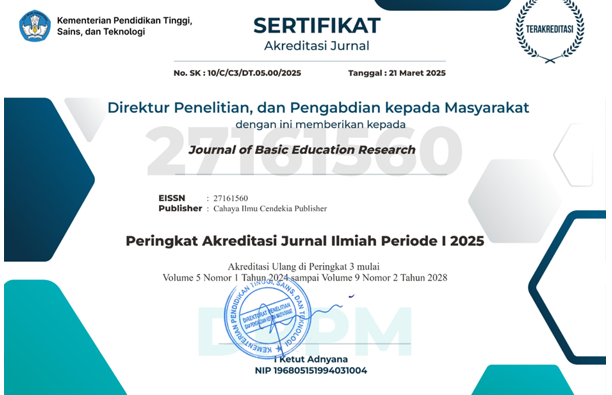Contextual Learning Model in Elementary Schools in Improving Learning Outcomes
Abstract
Purpose of the study: This research aims to improve students' cognitive learning outcomes by applying the Contextual Teaching and Learning learning model.
Methodology: The research method used is Classroom Action Research, which consists of three cycles. The sampling technique was purposive sampling, with the sample being class III.B with a total of 31 students, consisting of 16 male and 15 female students. The research instruments used were observation sheets and student learning outcome assessment formats. The data analysis techniques used in this research are quantitative and qualitative data.
Main Findings: The results of this research indicate that the application of the Contextual Teaching and Learning learning model can improve cognitive learning outcomes for theme 1 subtheme 2 in class III.B students, with learning completion results in cycle I 58%, cycle II 74.1%, cycle III 87% and post-test 90.3%, with a percentage of success requirements of 85%.
Novelty/Originality of this study: The Contextual Teaching and Learning learning model can improve learning outcomes for theme 1 subtheme 2 class III.B at Elementary School 25 Palembang.
References
A. Salahudin, “Filsafat Pendidikan,” Bandung: Pustaka Setia, 2011.
Depdiknas, “Undang-undang RI No.20 tahun 2003 tentang Sistem Pendidikan Nasional,” 2003.
T. Rahmawati, “Penerapan Model Pembelajaran CTL untuk Meningkatakan Hasil Belajar Siswa Sekolah Dasar Pada Mata Pelajaran IPA,” Jurnal Ilmiah Pendidikan dan Pembelajaran, 2, 12-20, 2018. https://doi.org/10.23887/jipp.v2i1.1376
S. N. I. Trisnawati, dkk, “Telaah Kurikulum Indonesia,” Surakarta: Penerbit Tahta Media Group, 2023
M. E. Sembiring, E. J. Simarmarta, & D. S. Tanjung, “Upaya Meningkatkan Hasil Belajar Siswa Melalui Model Pembelajarankooperatif Tipe Think Pair Share Pada Tema Praja Muda Karana Di Kelas III SD Swasta Advent Timbang Deli,” Jurnal Pendidikan Sekolah Dasar, 11 (1), 78-87, 2022, http://doi.org/10.33578/jpfkip.v11i1.8517
S. A. Pohan & F. Dafit, “Pelaksanaan Pembelajaran Kurikulum 2013 Di Sekolah Dasar,”Jurnal Basicedu,5 (3), 2021, http://doi.org/10.31004/basicedu.v5i3.898
Fadhilaturrahmi, R. Ananda, & S. Yolanda, “Persepsi Sekolah Dasar terhadap Pembelajaran Jarak Jauh di Masa Pandemi Covid 19,” Jurnal Basicude, 5 (3), 168-1688, 2021, https://doi.org/10.31004/basicedu.v5i3.1187
F. M. A. Simorangkir, & D. S. Tanjung, “Analisi Pelaksanaan Pembelajaran Tematik dengan Pendekatan Multiple Intelligensi Berbasis Budaya Batak Angkola Untuk Siswa Kelas IV Sekolah Dasar,” .Jurnal Education and Development, 7 (4), 302 – 304, 2019, https://doi.org/10.37081/ed.v7i4.1427
A. Mulia, “Penggunaan Media Pembelajaran Berbasis Video untuk Meningkatkan Hasil Belajar Peserta Didik,” Jurnal Pendidikan Tambusai, 2 (2), 545-555, 2018. https://doi.org/10.31004/jptam.v2i4.7
Mulidasari & Novianti, “Upaya Meningkatkan Hasil Belajar Siswa Kelas III Pada Konsep Pecahan Melalui Penerapan Model Pembelajaran Picture and Picture,” Jurnal Pendidikan Matematika dan Sains, 90-94, 2022. https://doi.org/10.51179/asimetris.v3i2.1560
N. Sakinah & Y. Ningsih, “Peningkatan Hasil Belajar Peserta Didik Pembelajaran Tematik Terpadu Tema 8 Menggunakan Pendekatan Contextual Teaching And Learning (CTL) di Kelas V SDN 16 Pandai Sikek Tanah Datar,” Jurnal Pendidikan Tambusai, 6 (2), 2022. https://doi.org/10.31004/jptam.v6i2.4786
M. Santoso, “Kolerasi Penggunaan Media, Disiplin Belajar dan Motivasi Belajar terhadap Prestasi Belajar IPS,” Cendikia: Jurnal Pendidikan dan pembelajaran, 9 (2), 149-158, 2016. https://doi.org/10.30957/cendikia.v9i2.36
E. Erwiza, S. Kartiko, and G. Gimin, “Factors affecting the concentration of learning and critical thinking on student learning achievement in economic subject,” Journal of Educational Sciences, 3(2), 205-215, 2019. http://dx.doi.org/10.31258/jes.3.2.p.205-215
M. Solichah, Akhwani, S. Hartatik, & S. Ghufron, “Meta-analisis pengaruh penggunaan media roda putar terhadap hasil belajar,” Wahana Sekolah Dasar, 28 (2), 51-59, 2020. http://dx.doi.org/10.17977/um035v28i22020p051
A. Shoimin, “68 Model Pembelajaran Inovatif dalam Kurikulum 2013,” Yogyakarta: Ar_Ruzz Media, 2017.
D. Rusman, “Pembelajaran Berbasis Teknologi Informasi dan Komunikasi,” Rajawali Pres: Depok Berdasarkan, 2013.
S. S. S. Dewi & E. A. Afriansyah, “Kemampuan Komunikasi Matematika Siswa Melalui Pembelajaran CTL,” JIPMAT, jilid 3, no 2, 145-155, 2018. https://doi.org/10.26877/jipmat.v3i2.2761
A. Kadir, “Konsep Pembelajaran Konseptual Di Sekolah,” Dinamika Ilmu.13(1), 17-38, 2013. https://doi.org/10.21093/di.v13i1.20
M. Hosnan, “Pendekatan Saintifik dan Kontekstual Dalam Pembelajaran,” Bogor: Ghalia Indonesia, 2016.
D. S. Mandasari, Warsono, & W. T. Subroto, “Pengembangan Bahan Ajar PKn Kelas V Yang Berorientasi Pada Pendekatan CTL (Contextual Teachin And Learning) untuk Meninkatkan Hasil Belajar Siswa Sekolah Dasar Di SDN Lepak 3 Bangkalan,” .Jurnal Rivide Pendidikan Dasar: Jurnal Kajian Pendidikan Dan Hasil Penelitian, 5 (2), 2019. https://doi.org/10.26740.jrpd.v5n2.p1003-1008
P. Rahmadhani and R. P. Wirayuda, “Analysis of Students’ Ability to Work on Higher Order Thinking Skills in Thematic Science Learning”, J. Bs. Edu. R, vol. 4, no. 1, pp. 39-44, 2023. https://doi.org/10.37251/jber.v4i1.300
N. Asiyah, “Penerapan Pembelajaran Tematik Dalam Penanaman Moral Anak Usia Dini”, J. Bs. Edu. R, vol. 1, no. 2, pp. 45-53, 2020. https://doi.org/10.37251/jber.v1i2.82
I. W. Ningsih, “Hubungan Karakter Tanggung Jawab Terhadap Hasil Belajar Pembelajaran Tematik”, J. Bs. Edu. R, vol. 3, no. 1, pp. 27-31, 2022. https://doi.org/10.37251/jber.v3i1.204
W. A. Kusuma, “Penelitian Tindakan Kelas,” Jakarta: PT Indeks, 2017.
Sugiyono, ”Metode Penelitian Kualitatif,” Bandung: Alfabeta, 2020.
Sugiyono, “Metode Penelitian Kuantitatif, Kualaitatif, dan R&D,” Bandung: CV Budi Utama, 2019.
W. Sumarni, S. Wardani, S. Sudarmin, and D. N. Gupitasari, “Project based learning (PBL) to improve psychomotoric skills: A classroom action research,” Jurnal Pendidikan IPA Indonesia, vol. 5, no. 2, pp. 157-163, 2016. https://doi.org/10.15294/jpii.v5i2.4402
Mukhtazar, “Prosedur Penelitian Pendidikan,” Yogyakarta: Absolute Media, 2020.
A. D. Prasetyo & M. Abduh, “Peningkatan Keaktifan Belajar Melalui Model Discovery Learning Di Sekolah Dasar,” Jurnal Basiced, 5 (4), 1717-1724, 2021. https://doi.org/10.31004/basicedu.v5i4.991
Murtadio & Aqib, “Kumpulan Metode (2nd ed)”, CV yrama widya, 2016.
M. Jamilah, “Upaya Meningkatkan Hasil Belajar Siswa Melalui Penerapan Pendekatan Contextual Teaching and Learning (CTL) Pada Mata Pelajaran IPS Di Kelas IV SD Negeri Tatakan 2 Kecamatan Tapin Selatan,” Jurnal Pendidikan Kewaraganegaraan, 2017. https://dx.doi.org/10.20527/kewarganegaraan.v7i1.3533
Irwan & Hasnawi, “Analisis Model Pembelajaran Contextual Teaching and Learning dalam Meningkatkan Hasil Belajar PPKn di Sekolah Dasar,” 3 (1), 235-245, 2021. https://doi.org/10.31004/edukatif.v3i1.343
E. Suryawati and K. Osman, “Contextual learning: Innovative approach towards the development of students’ scientific attitude and natural science performance,” Eurasia Journal of mathematics, science and technology education, vol. 14, no. 1, pp. 61-76, 2017. https://doi.org/10.12973/ejmste/79329
A. Ramadhanti and N. N. Simamora, “The Use of Fractional Card Media-Based Concept Attainment Models to Improve Understanding of Fractional Concepts”, J. Bs. Edu. R, vol. 4, no. 1, pp. 10-19, 2023. https://doi.org/10.37251/jber.v4i1.305
F. Soleha, Akhwani, Nafiah, & D. W. Rahayu, “Model Pembelajaran Contextual Teaching and Learning untuk Meningkatkan Hasil Belajar Pkn di Sekolah Dasar,” Jurnal Basicedu, 5 (5), 3117-3124, 2021. https://doi.org/10.31004/basicedu.v5i5.1285
J. I. Pangandaman, “Association of Learners Academic Performance with the Preparedness and Competence in the Implementation of Modular Learning Among Secondary School Teachers at Lanao del Norte”, J. Bs. Edu. R, vol. 4, no. 2, pp. 57-62, 2023. https://doi.org/10.37251/jber.v4i2.313
Irwan & Hasnawi, “Analisis Model Pembelajaran Contextual Teaching and Learning dalam Meningkatkan Hasil Belajar PPKn di Sekolah Dasar,” 3 (1), 235-245, 2021. https://doi.org/10.31004/edukatif.v3i1.343
Copyright (c) 2023 Dian Wulansari, Anita Putri Oktariani, Marwan Pulungan

This work is licensed under a Creative Commons Attribution-NonCommercial 4.0 International License.
Authors who publish with this journal agree to the following terms:
- Authors retain copyright and acknowledge that the Journal of Basic Education Research is the first publisher licensed under a Creative Commons Attribution 4.0 International License.
- Authors are able to enter into separate, additional contractual arrangements for the non-exclusive distribution of the journal's published version of the work (e.g., post it to an institutional repository or publish it in a book), with an acknowledgment of its initial publication in this journal.
- Authors are permitted and encouraged to post their work online (e.g., in institutional repositories or on their website) prior to and during the submission process, as it can lead to productive exchanges and earlier and greater citation of published work.





.png)


.png)
.png)


















